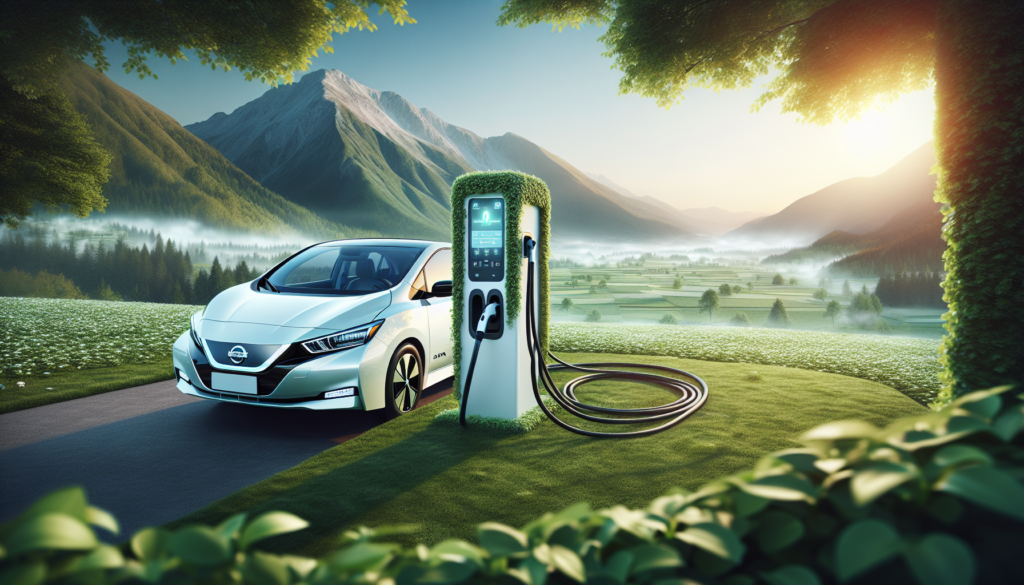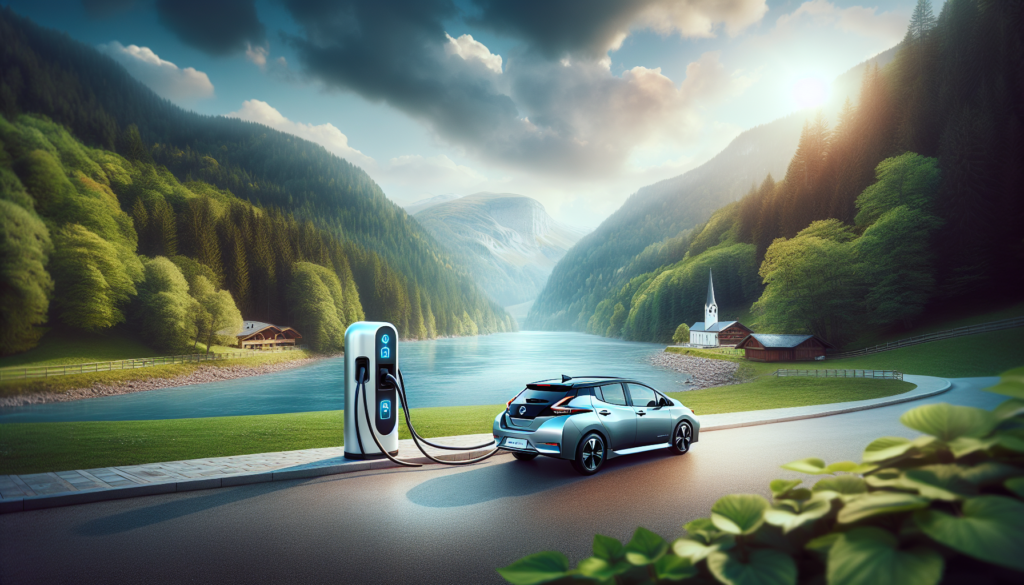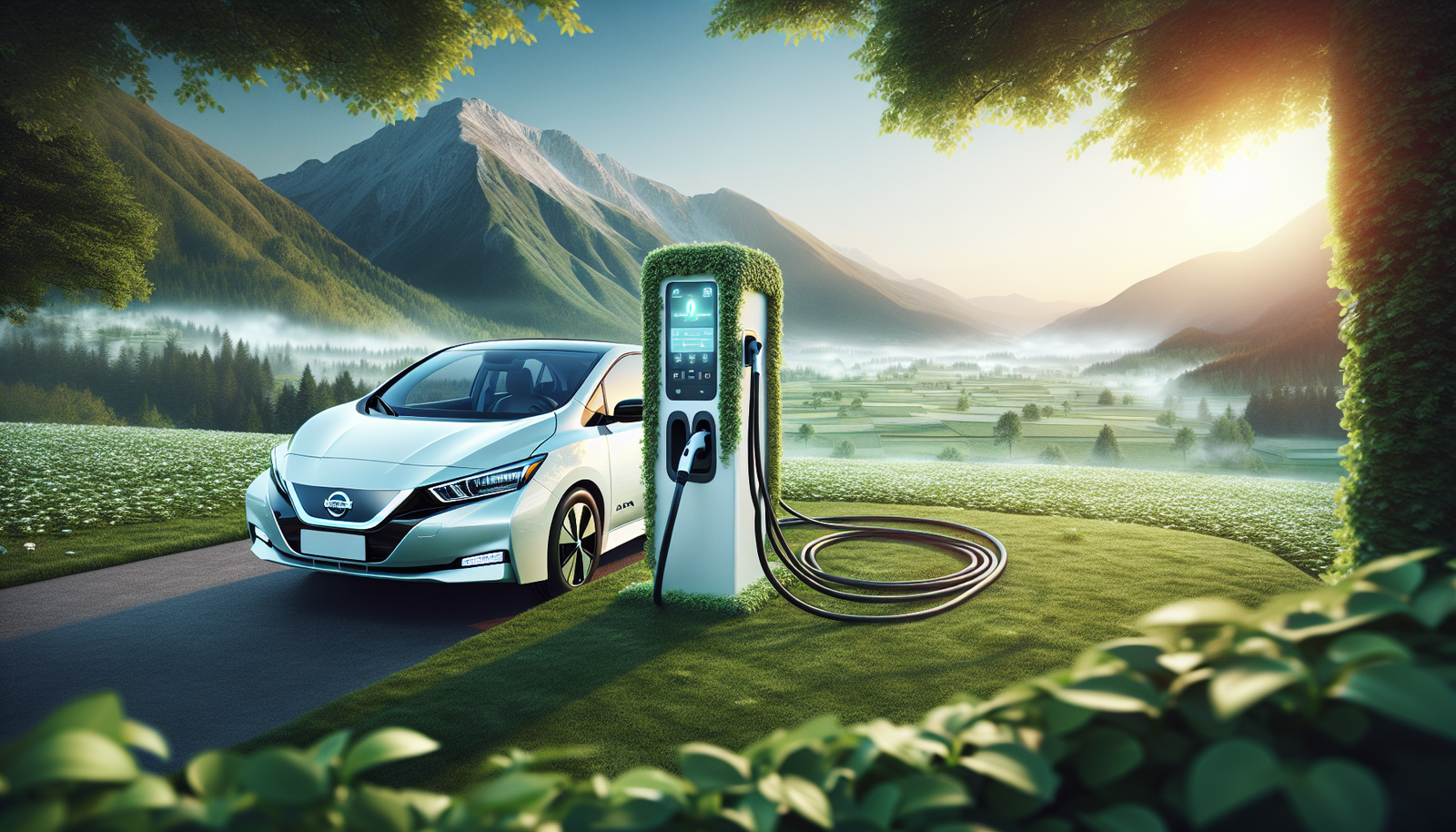If you’re the proud owner of a Nissan Leaf electric vehicle, you’re probably well aware of the numerous benefits of driving an eco-friendly car. But have you ever wondered about the different charging options available to keep your Leaf powered up? From home-based charging stations to public charging points, there are several convenient and efficient ways to juice up your electric ride. In this article, we’ll explore the various charging options for the Nissan Leaf and help you choose the one that best fits your needs and lifestyle. So, whether you’re a long-time Leaf owner or considering taking the plunge into the world of electric vehicles, read on to discover the charging solutions that will keep you cruising with ease.

Level 1 Charging
Overview
Level 1 charging refers to the basic, standard method of charging the Nissan Leaf electric vehicle. This level of charging utilizes a standard household electrical outlet, commonly known as a 120-volt outlet. Level 1 charging is the slowest method of charging and is typically used for overnight charging or when no other charging options are available.
Charging Time
With level 1 charging, the charging time for the Nissan Leaf can vary depending on the level of charge required. On average, a full charge can take anywhere from 8 to 20 hours using a level 1 charger. While this may seem like a lengthy time, it is important to remember that level 1 charging is most commonly used during extended periods of vehicle downtime, such as overnight.
Charging Equipment
Level 1 charging requires minimal charging equipment. All that is needed is the included charging cable that comes with the Nissan Leaf, which can be plugged into a standard household outlet. This makes level 1 charging extremely accessible and convenient, as it can be done almost anywhere with an electrical outlet.
Level 2 Charging
Overview
Level 2 charging is a faster and more efficient charging option compared to level 1 charging. This level of charging utilizes a 240-volt outlet, similar to the outlets used for large appliances like clothes dryers or electric stoves. Level 2 charging is commonly installed in residential homes, workplaces, and public charging stations.
Charging Time
With level 2 charging, the charging time for the Nissan Leaf is significantly reduced compared to level 1 charging. On average, a full charge can take anywhere from 4 to 8 hours using a level 2 charger. This makes level 2 charging a suitable option for those looking for faster and more convenient charging times.
Charging Equipment
To utilize level 2 charging, a dedicated charging station is required. This charging station typically needs to be installed by a professional electrician and requires a dedicated 240-volt circuit. The charging station is then connected to the Nissan Leaf using a specialized charging cable, which offers faster charging times compared to level 1 charging.
Installation Considerations
When considering level 2 charging, it is important to assess the installation requirements. The installation of a level 2 charging station often requires professional assistance to ensure proper electrical wiring and compatibility. Additionally, it is crucial to determine if the electrical service in your home or establishment can support the charging station’s power load.
Level 3 Charging (DC Fast Charging)
Overview
Level 3 charging, also known as DC Fast Charging, represents the fastest charging option available for the Nissan Leaf. This method utilizes direct current (DC) and provides high power delivery, significantly reducing the charging time compared to level 1 and level 2 charging. Level 3 charging is commonly found at public charging stations and is ideal for long-distance travel or quick top-ups.
Charging Time
Level 3 charging offers a substantial reduction in charging time for the Nissan Leaf. This type of charging can provide an 80% charge in approximately 30 minutes, depending on factors such as battery capacity and current charge level. The quicker charging time makes level 3 charging a desirable option for those needing a quick and convenient charging solution.
Charging Equipment
Level 3 charging requires specific equipment, including high-powered charging stations designed for DC fast charging. These charging stations are equipped with specialized connectors that can deliver a high level of electrical current directly to the Nissan Leaf’s battery. It is important to note that level 3 charging equipment is not typically available for residential installation.
Public Charging Stations
Level 3 charging is predominantly available at public charging stations, allowing Nissan Leaf owners to access fast charging options while on the go. These charging stations can be found at shopping centers, rest areas, and other convenient locations. It is essential to plan routes accordingly to ensure access to these charging stations for longer journeys.
CHAdeMO Charging
Overview
CHAdeMO charging is a specific type of level 3 charging available for the Nissan Leaf. It is an industry-standard charging protocol that provides compatibility between various electric vehicle models. The CHAdeMO charging standard is widely supported by many automakers and public charging networks.
Charging Time
Similar to other level 3 charging options, CHAdeMO charging offers a quick charging time for the Nissan Leaf. With a CHAdeMO charger, it is possible to achieve an 80% charge within approximately 30 minutes. This makes it an attractive choice for Nissan Leaf owners who need a fast and efficient charging solution.
Charging Equipment
To utilize CHAdeMO charging, a compatible CHAdeMO charger is required. This charger is generally found at public charging stations that offer level 3 charging. The CHAdeMO charger features a specific connector that is designed to fit into the Nissan Leaf’s charging port, allowing for a seamless and secure connection during the charging process.
Network Availability
The CHAdeMO charging standard has widespread availability in many regions, making it easier for Nissan Leaf owners to find compatible public charging stations. Public charging networks and various organizations actively support and maintain CHAdeMO charging stations, providing greater flexibility for electric vehicle owners.

Tesla Supercharger
Overview
The Tesla Supercharger network provides a unique charging option exclusively for Tesla vehicles, including the Nissan Leaf with a CHAdeMO adapter. Tesla Superchargers are high-powered charging stations strategically placed along major travel routes, offering fast and convenient charging for long-distance electric vehicle travel.
Charging Time
Utilizing the Tesla Supercharger network with a CHAdeMO adapter can provide efficient charging times for the Nissan Leaf. Similar to other level 3 charging options, it is possible to achieve an 80% charge in approximately 30 minutes with the Tesla Supercharger. This allows for a quick and seamless charging experience during long journeys.
Charging Equipment
To utilize the Tesla Supercharger network with a Nissan Leaf, a CHAdeMO adapter is needed. This adapter allows the Nissan Leaf to connect to the Tesla Supercharger station’s connector, enabling efficient charging. It is important to note that the CHAdeMO adapter is a separate accessory and needs to be purchased separately.
Compatibility
While the Tesla Supercharger network primarily caters to Tesla vehicles, the availability of a CHAdeMO adapter allows Nissan Leaf owners to access the Tesla Supercharger stations. This compatibility provides greater convenience for Nissan Leaf owners, as they can utilize a well-established network of fast charging stations during their travels.
Occasional Use Cable
Overview
The Nissan Leaf also comes with an occasional use cable, commonly known as a trickle charger. This option provides an additional means of charging and is used when other charging options are not readily available. The occasional use cable allows for flexibility in charging the vehicle in various situations.
Charging Time
Using the occasional use cable for charging the Nissan Leaf tends to have the longest charging time compared to other charging options. A typical full charge can take anywhere from 12 to 24 hours when utilizing the occasional use cable. Therefore, this method is most suitable for situations where a slow and steady charge is sufficient.
Charging Equipment
The occasional use cable is included with the purchase of the Nissan Leaf. This cable features a standard 120-volt plug that can be connected to a regular household outlet. While it is not the fastest charging option, having the occasional use cable as a backup provides peace of mind for Nissan Leaf owners in case of emergency situations or limited charging infrastructure.
Convenience
One of the primary advantages of the occasional use cable is its convenience. As it utilizes a standard household outlet, the occasional use cable can be used almost anywhere with access to electricity. This makes it an ideal charging option for emergency situations or when other charging methods are unavailable, ensuring that the Nissan Leaf can still be charged when needed.
Home Charging Installation
Overview
Installing a dedicated home charging station for the Nissan Leaf offers convenience and faster charging times, eliminating the need to rely solely on public charging infrastructure. Home charging installation provides a reliable and always-accessible charging solution, making it an excellent investment for Nissan Leaf owners.
Professional Installation
For the installation of a home charging station, the assistance of a professional electrician is usually recommended. The electrician will assess the electrical capacity of your home and install the necessary equipment, such as a dedicated circuit breaker and charging station. Professional installation ensures compliance with electrical codes and guarantees safe and efficient charging.
DIY Installation
While professional installation is recommended, some Nissan Leaf owners may opt for a do-it-yourself (DIY) approach. However, it is crucial to have a thorough understanding of electrical systems and the necessary safety precautions. DIY installation requires careful planning, proper electrical wiring, and testing to ensure a safe and reliable charging setup.
Cost Considerations
The cost of home charging installation can vary depending on various factors, such as the complexity of the electrical work required and the charging station chosen. Professional installation costs typically include the electrical work, equipment, and labor. DIY installation costs may be lower, but it is essential to consider the time and effort required, as well as the potential risks if not done correctly.
Public Charging Stations
Overview
Public charging stations play a vital role in supporting the charging needs of Nissan Leaf owners, particularly when traveling longer distances or when alternative charging options are limited. Public charging stations are strategically placed in various locations, allowing for convenient and accessible charging outside of the home.
Charging Networks
Public charging stations are often connected to charging networks that facilitate the charging process and provide additional amenities for electric vehicle owners. These networks may require a membership or a charging card to access their charging stations. It is essential to research and familiarize yourself with the charging networks available in your region to ensure seamless charging experiences.
Charging Costs
Public charging stations may have various pricing structures for their charging services. Some stations offer free charging, while others charge a per kilowatt-hour (kWh) rate or a flat fee. Additionally, some charging networks may require a membership or subscription fee. Understanding the charging costs associated with public charging stations can help plan and budget for charging expenses.
Charging Infrastructure
The availability and accessibility of public charging stations are constantly expanding, driven by the growing adoption of electric vehicles. Charging infrastructure is being developed in urban areas, along highways, and at various destinations, making it easier and more convenient for Nissan Leaf owners to find and utilize public charging stations. Public charging infrastructure plays a crucial role in promoting widespread electric vehicle adoption.
Charging Standards
Overview
Charging standards define the technical specifications and connectors used for electric vehicle charging. They ensure compatibility between various electric vehicle models and charging equipment, allowing for a seamless charging experience. Understanding the different charging standards can help Nissan Leaf owners navigate the charging landscape and make informed decisions.
CHAdeMO
CHAdeMO is a widely recognized fast charging standard that utilizes direct current (DC) for rapid charging. It originated in Japan and is favored by many automakers and public charging networks. Nissan Leaf owners can access CHAdeMO charging stations with a compatible CHAdeMO charger or adapter, providing quick and efficient charging solutions.
CCS (Combined Charging System)
CCS, also known as Combo Charging System, is a fast charging standard developed by a consortium of automakers. It combines both AC (alternating current) and DC charging capabilities, allowing for flexible charging options. While CCS is not commonly used by Nissan Leaf models, some newer versions may offer CCS compatibility.
Tesla Supercharger
The Tesla Supercharger network utilizes a unique charging standard designed specifically for Tesla vehicles. However, with the use of a CHAdeMO adapter, Nissan Leaf owners can access Tesla Supercharger stations, expanding the charging options available. The Tesla Supercharger network offers high-speed charging, making it an attractive choice for long-distance travel.
Charging Etiquette
General Rules
When utilizing public charging stations, it is important to follow general charging etiquette to ensure fair and efficient use of the available charging infrastructure. Some basic rules to consider include not occupying a charging space longer than necessary, always leaving contact information visible in case someone needs to reach you, and being considerate of others who may also need to charge their vehicles.
Sharing Chargers
In situations where charging stations are limited, it may be necessary to share chargers. If all the available charging spaces are occupied, it is courteous to disconnect your vehicle once it has reached an acceptable charge level, allowing others to access the charger. Being mindful of the needs of others ensures that everyone has the opportunity to charge their electric vehicles.
Parking Etiquette
It is important to remember that charging stations are primarily intended for charging electric vehicles, not long-term parking. Once your vehicle has reached an adequate charge level, it is considerate to promptly move your vehicle to another parking space, allowing other vehicles to utilize the charging station. This practice ensures that charging stations are used efficiently and effectively.
By understanding the various charging options available for the Nissan Leaf, including level 1 and level 2 charging, as well as level 3 charging options like CHAdeMO and the Tesla Supercharger network, Nissan Leaf owners can make informed choices about the most suitable charging method for their needs. Additionally, considering the convenience and benefits of home charging installation, along with proper charging etiquette at public charging stations, will contribute to a seamless and enjoyable electric vehicle ownership experience. With a range of charging options available, charging the Nissan Leaf is made easy, accessible, and efficient, ensuring that you can enjoy all the benefits of electric vehicle ownership without the worry of running out of power.

